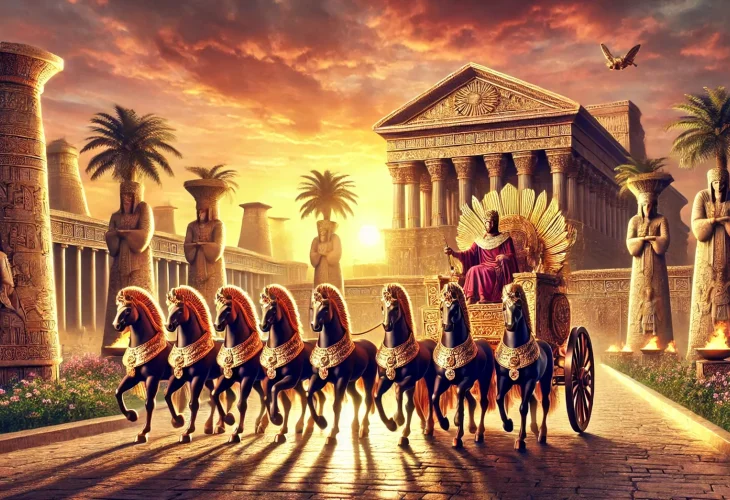The Karaites: How It All Began
Anan attempted to establish an ideology, reminiscent of the Sadducees. Rejecting the Oral Torah, his decrees were based solely on Scripture, leading to the name 'Karaites.'

About twelve hundred years ago, in the year 765 (by the Jewish calendar, 4725), the Abbasid Caliph, Abdallah ibn Mohammed al-Mansur, summoned the elders of the Jewish community to his splendid palace in Baghdad. He began by saying, "Welcome, esteemed scholars of the Book. I've heard your high religious leader, the Exilarch Hananiah, descendent of the beloved Bostanai, has died peacefully. I wish to appoint a new leader under my authority as the servant of the Great Caliph. Did Hananiah have any sons?"
"No," answered the wise men of Babylon. "Hananiah died without children."
"Are there any other relatives from the illustrious seed of Bostanai, beloved of God?" asked the Caliph.
The wise men were well aware that the Caliph knew the answer. Even in Persia, he knew Anan ben David, great-grandson of Bostanai, and the meeting's purpose was to appoint him to the position of Exilarch with the apparent agreement of the Babylonian scholars.
The scholars recoiled at the very thought of this Anan becoming the spiritual leader of the esteemed Babylonian Jewry, for, despite being a descendant of Bostanai, he had not grown up in Babylon among the yeshivas and scholars, but in Persia, which at the time was far removed from learning centers. Its inhabitants were ignorant of the Talmud. Anan was a narcissist willing to do anything for glory and fame and was far from deserving of this high position, held for many centuries by the descendants of King David.
Three years earlier, al-Mansur had moved the capital of the Abbasid Empire from Persia to Baghdad. He sought to be involved in all matters of his capital, including the Jewish leadership. This appointment was a finished decision in his mind, which he indeed gently imposed on the Babylonian scholars. Anan ben David arrived on a golden chariot drawn by ten horses and made his way to the Exilarch's palace...
If the Babylonian scholars thought Anan would conform to Jewish law, they quickly discovered their mistake. Rumors ran through Baghdad daily: the Exilarch ruled that one could do such and such, along with other strange decrees with no basis, clearly the words of an ignorant man. The Babylonian scholars were dismayed. How could they uphold the Torah tradition if their Exilarch himself acted like a clown, oblivious to the ways of Jewish law?
Here, an unknown factor intervened, taking action. History doesn't tell whose hand was involved, but within days, a troop of soldiers from the Caliph's fortress came and led the newly appointed Jewish Exilarch to the dungeon. He was charged with rebellion against the kingdom, and the prosecutor demanded his execution.
While imprisoned, Anan shared a cell with a soon-to-be-famous man: his cellmate was Imam Anm al-Nu'man Abu Hanifa, founder of one of the schools of Sunni Islam. From him, Anan learned something interesting: as long as you are part of the existing religion, any deviation is considered betrayal. But if you declare yourself the founder of a new religious movement, the Abbasid caliphs look favorably upon that. The Imam extricated himself from prison this way, and Anan followed suit: at his trial, he declared himself the founder of a new religious movement, freeing himself from the obligations to the norms of the Babylonian sages.
Anan left prison but did not return to the Exilarch's residence, as he was now a "founder of a new religious movement." Initially, Anan's "movement" was quite attractive: he simply declared that one did not need to heed the scholars of the Torah. How easy, for everyone to do as they please... His followers were called "Ananites," primarily coming from Persia, a place unfamiliar with the Talmud and resentful of all the "stringencies" of Jewish law.
However, over time, it became clear that Anan sought to establish some ideology. To justify his rulings, he somewhat revived the ideology of the Sadducees: he did not accept the Oral Torah and decided everything based on Scripture alone, hence the name "Karaites." Anan spent twenty-five years developing his new Torah, and in 770, published his book, "Book of Commandments," where he interpreted every commandment according to his own understanding, ignoring interpretations accepted in Israel for two millennia before him.
Over time, his followers realized Anan was mad. He couldn't genuinely support his interpretations, since without tradition, anyone can interpret as they wish. Anan decreed that one must not keep a light on in the house on Shabbat eve, since it says "Do not kindle a fire," so his followers sat in darkness and, of course, ate cold food, since keeping a fire was forbidden. He imposed numerous fasts on them and forbade them from going to a doctor, since it says "I am Hashem, your healer"—if Hashem brought illness, we mustn't take it (the Sages interpreted: "And he shall surely heal," allowing a doctor to heal). He imposed absurd restrictions, such as: the Torah forbids marrying a relative, so one must not marry even the relative of a relative, and thus not the relative of a relative of a relative, so a man was forbidden to marry a woman who, after a chain of twenty people, had a family connection.
Seeing that the sharp-minded Babylonians did not "buy" his method, Anan asked permission from the Caliph to move with his "religious movement" to the Land of Israel, which he received. Anan moved to Jerusalem and established a Karaite synagogue there. At the time, the settlement in Jerusalem was small and weak, comprised of the underprivileged, so he found there simple folks who faithfully believed in the "great sage" from Babylon. Eventually, he moved to Egypt and founded a community there in a similar fashion.

